How to comprehensively deepen reforms and reignite economic growth? 47th Tsinghua University Forum on China and the World Economy
Originally published July 9, 2024, in Chinese on the ACCEPT website. Translated by ACCEPT.
Source: http://www.accept.tsinghua.edu.cn/2024/0709/c25a6214/page.htm
How to comprehensively deepen reforms and reignite economic growth?
47th Tsinghua University Forum on China and the World Economy
On July 8, 2024, the 47th Tsinghua University Forum of China and the World Economy, organized by the Academic Center for Chinese Economic Practice and Thinking (ACCEPT) at Tsinghua University, was broadcasted online. Guests included Chai Qiang, President of the China Institute of Real Estate Appraisers and Agents (CIREA); Da Wei, Director of the Center for International Security and Strategy (CISS) and Professor in the Department of International Relations at Tsinghua University’s School of Social Sciences; Hua Changchun, Chief Economist for Greater China at Kohlberg Kravis Roberts & Co.; David Daokui Li, Director of Tsinghua ACCEPT, Professor at Tsinghua University’s School of Economics and Management and Co-President of the Society for Government and Economics (SAGE); Liu Peilin, Research Fellow at Tsinghua ACCEPT; Helen Hong Qiao, Managing Director, Chief Economist for Greater China and Head of Economic Research for Asia at Bank of America Securities; Yin Yanlin, Vice Chairman of the Economic Committee for the 14th National Committee of the Chinese People's Political Consultative Conference (CPPCC) and former Deputy Director of the Office of the Central Financial and Economic Affairs Commission; and Yuan Gangming, Honorary Senior Researcher at Tsinghua ACCEPT, among others. Li Ke’aobo, Executive Deputy Director of Tsinghua ACCEPT, presided over the event as forum moderator.
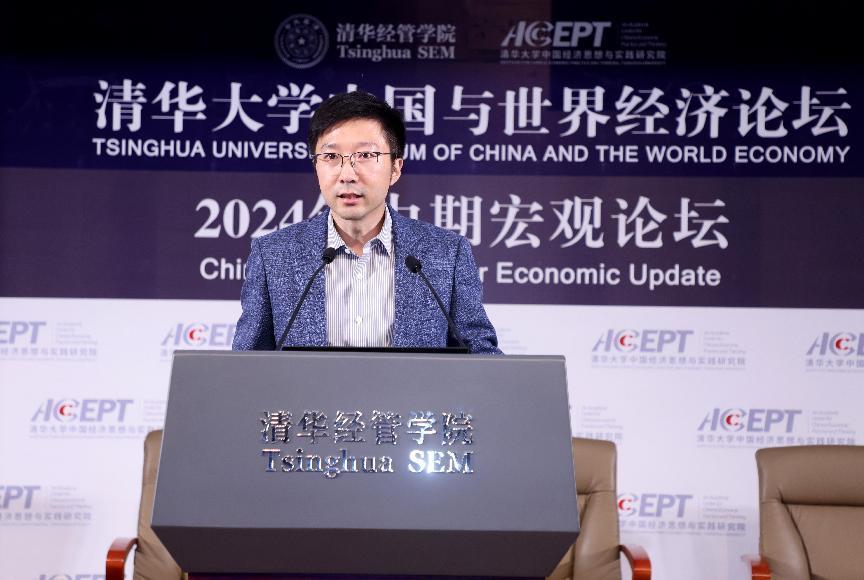

During the proceedings, Lu Lin (top-left), Wu Shuyu (top-right), Li Bing (bottom-left), and Guo Meixin (bottom-right), researchers at Tsinghua ACCEPT, jointly released the research institute’s latest China Macroeconomic Analysis and Forecast Report entitled China's Economic Development Prospects for the Second Half of 2024.
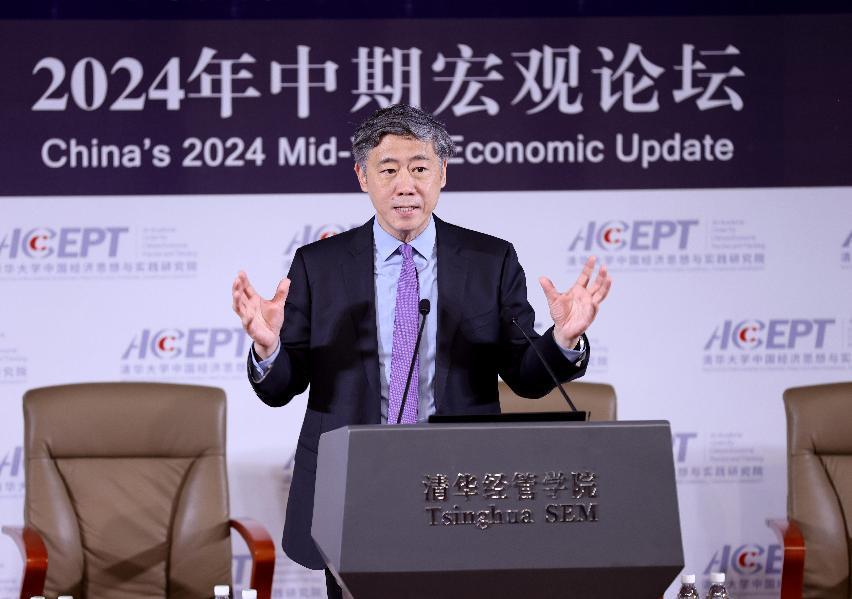
Tsinghua ACCEPT Director David Daokui Li first discussed the content of the report and emphasized that in the run-up to the Third Plenary Session of the 20th Central Committee of the Communist Party of China, the research team remains fully confident in China's economy and firmly convinced that through the comprehensive deepening of reforms, China's economy will be able to resolve its current problems, return to relatively rapid growth and get back on track towards high-quality development. He then went on to outline some of the report's key takeaways:
First, based on the premise of maintaining confidence, it is necessary to raise one’s awareness and be prepared for unexpected developments, while preventing shorter-term and cyclical factors from evolving into longer-term tendencies as a result of delayed policy responses, which will ultimately have an impact on China’s longer-term GDP growth potential. The public sector must take a more proactive stance to guard against and defuse any systemic risks, including setting up emergency management teams focused on systemic risks and introducing exemptions in order for these teams to perform their duties.
Second, the core factor contributing to China’s current economic woes is not its real estate sector, but instead comes from the ongoing shrinking of the country’s public sector. Generally speaking, the government will collect taxes from households and the private sector, in addition to borrowing money from the banking sector, in order to play a role in supporting economic development, engage in procurement and cover any recurrent expenditures. Over the past four years, overall spending in the public sector has fallen from 41.2% to 37.4% of GDP. Meanwhile, borrowing in the banking sector has slowed down, with much of the financing mainly being used to service debt and with the amount being put to work in the real economy having been significantly reduced. As a major sector of a modern-day market economy, a 3.8 percentage point decline in government spending will inevitably lead to an economic contraction.
Third, in order to solve the current issues facing the economy, it is necessary to further deepen reforms in an all-round way. The most urgent and critical task is to halt the contractionary trend in the public sector while boosting overall government spending. To this end, there are two reform measures that must be immediately put into effect. First, a reset is needed in our thinking regarding the nature of sovereign debt. Instead of forcing local governments to repay their debts, more of this debt burden should be absorbed by the central government, including by replacing these local government debts with central government treasury bonds, so as to reactivate the normal level of economic activity in localities and create a favorable atmosphere for comprehensively deepening reforms within a shorter time horizon. If such measures can be implemented promptly within the short term, it is expected to lead to a faster improvement in the economy’s aggregate demand. Second, from the perspective of longer-term institutional reform, and in order to transform the orientation of the government's overall functional approach, it is now necessary to readjust government incentives by reforming the fiscal and taxation systems as well as the targets used to evaluate the performance of local officials. This means shifting from the current investment and project-based policy direction towards one that focuses on the provision of basic social welfare, which in turn will boost the disposable incomes of Chinese residents and therefore increase overall consumption. In short, the government must transform from an investment-oriented government to become a social welfare service-oriented government.
Li further pointed out that in the second half of 2024, it is essential to seize the opportunity to roll out shorter-term policies to boost consumption and buoy the growth prospects for the overall Chinese economy within the immediate future. For example, the central government can issue consumption vouchers in the order of 1 trillion yuan during the National Day Golden Week to encourage or subsidize people's consumption. Based on the multiplier effect that would result from distributing these consumption vouchers, it is expected that for every yuan offered in the form of a voucher would generate roughly four yuan in consumption. According to Tsinghua ACCEPT's estimates, the issuance of consumption vouchers ultimately would not by and large reduce the central government's revenues, but instead could be traded off for greater consumer confidence, improved market performance and an overall upgrade in the trend line for China's economy. If reform policies are effectively put into place, the research institute’s annual projection for China's GDP growth rate in 2024 currently amounts to 5.1%, with the economy moreover expected to continue stabilizing and rebounding moving forward.

After the keynote speeches, the forum moved onto a roundtable discussion with the Executive Deputy Director of Tsinghua ACCEPT, Li Ke’aobo, posing a series of questions on the latest hot topics and economic issues while moderating an exchange between distinguished guests in attendance both in person and online.
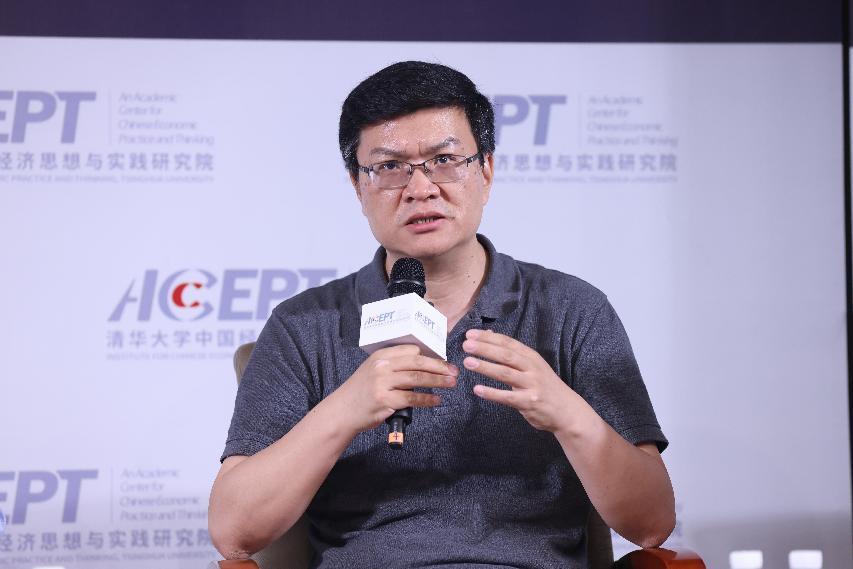
[1] Da Wei expressed that the current international environment is highly uncertain, with the policy direction of the United States being especially difficult to predict. According to available data, the current state of the economy and technological development in the U.S. looks promising, but whether this situation can be sustained is another question. The rest of the world meanwhile considers China’s economic forecast to be comparatively poor, which has since become the consensus view. This not only affects foreign investment coming into China, but also affects foreign students' willingness to select China to pursue studies abroad. He stressed that the great game between China and the U.S. does not only revolve around the size of each country’s overall economies, but involves competition in the high-tech and military sectors, among many other areas. He pointed out that even if China's economy becomes twice the size of the U.S. economy, so long as the Americans are willing to do so, they can stir up trouble and create a situation in which China is subjected to enormous challenges. In order to effectively boost confidence in the domestic market, Da suggested that the government should enhance market morale through clear political signals and a stable legal system. At the same time, he stressed the need to avoid excessive intervention in private enterprises while protecting their legitimate rights and interests in order tomaintain the vitality of China’s economy. He noted that policy transparency and stability are crucial factors for maintaining market confidence, which means that governments must set a clear policy direction and ensure its continuity.

[2] Chai Qiang considers the predicament facing China's real estate market to primarily derive from the inevitable patterns that underpin an industry’s development. After multiple decades of large-scale urban development and construction, the Chinese people have more or less resolved the problem of “having or not having housing,” and are now gradually transitioning towards the new criterion of “having superior or inferior housing.” Therefore, the real estate market is inevitably facing a transformation from a continual expansion in the development of new housing stock to the reconsolidation of existing housing stock, with the development model of the past that focused on large-scale expansion and construction no longer being applicable. In the past, real estate companies turned a blind eye to their expansionary behavior, which became manifested in their “three highs” approach to development, i.e.,“high leverage, high debt, and high turnover rate,” having failed to adapt themselves to the transformation of the market in a timely manner. This situation has thus given rise to the current predicament and has in turn also created a drag on the overall macroeconomy.
Chai observed that last year and this year's optimization and readjustment of real estate policy, despite being quite robust, nonetheless did not produce the intended effect, which mainly reflects the fact that the macroeconomy composes multiple components, with any stimulus policy focusing solely on the real estate market therefore being limited in its effectiveness. Any upturn in the real estate market depends first and foremost on making an overall recovery in the macroeconomy; that is to say, an improvement in Chinese residents’ employment, incomes and other indicators. Therefore, the injection of short-term stimulus cannot fundamentally reverse the downturn in this sector. When taking a longer-term outlook, Chai asserted that he remains optimistic about the future development prospects for the country’s real estate market. Given that housing in the real estate sector first and foremost of all stands for “living and working in peace and contentment,” and represents an interest-bearing asset with practical everyday value, housing simply cannot be compared to other assets such as gold or cash. Judging from the experience of Japan and the U.S., high-quality real estate properties will eventually “bypass cyclicity” to reinvigorate the market back towards a level more in keeping with its actual value.
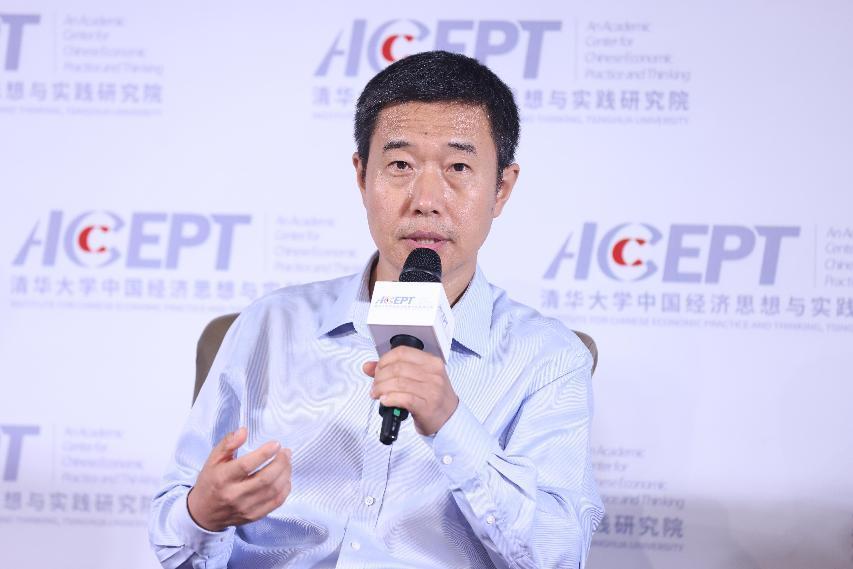
[3] Liu Peilin underscored that China should pay more attention to investing in people, including enhancing people's productive potential and mobilizing their consumption demand. China still has significant growth potential leftover, so there is ample reason to remain confident. Moreover, there is no contradiction between improving the quality of growth and sustaining a higher growth rate.
Over the past few years, the central government has introduced a number of measures to prop up the development of the economy’s private sector, but the momentum generated by these policy moves has gone largely unregistered, which may possibly reflect the drawn-out process for putting these policies into effect. A new problem that is impacting the development of the private sector has arisen as a result of the rights and interests of enterprises and entrepreneurs having been impaired. At present, there is an unfavorable atmosphere both in the public opinion and behavior of the broader society, with some policies enacted by the central government having been misunderstood or misinterpreted at the societal level, which is hence contrary to the original intention of the central government. For example, if an enterprise wants to contribute to “common prosperity,” the proper approach is to do a good job in managing the company and creating wealth for society, rather than killing the rich to help the poor or “the third distribution” of voluntary donations to public welfare as some people may think. As for the solution to this problem, the central government should take the initiative to dispatch relevant agencies or establish routine mechanisms to conduct a coherent assessment of economic policies aimed at developing the private sector, in this way making sure that all the various policies are followed and implemented to the letter.
On a related matter, some government departments at the grassroots level have misread the intention behind the central government's policies. For example, the central government did not say that the taxes should be audited, but in reality certain actors in the market have encountered such a scenario. The reason for this may be due to the overall economic slowdown, with local governments searching for various alternative tax sources given their need to repay outstanding debts. This kind of phenomenon will begin to disappear only when the macroeconomy regains its strength and economic forecasts are revised upwards.

[4] Hua Changchun drew attention to the fact that if longer-term economic growth remains below the overall potential growth rate, this will undermine the confidence of domestic residents and entrepreneurs, while reduced employment for young people will have a profound impact on the fundamentals for the country’s continued economic development. Thus, it is currently of the utmost importance to work towards restoring economic momentum and shoring up market demand. At present, China is showing signs of a balance-sheet recession, which could further contribute to the erosion of the country’s entrepreneurial spirit and economic vitality, posing a huge obstacle in the way of sustaining its economic development.
When talking about the similarities and differences between China's current asset price decline and Japan's “three lost decades,” Hua Changchun remarked that Chinese assets in the capital market at present has followed a tendency resembling that of Japanese assets in 1992. However, whether or not this hypothesis is borne out remains to be seen given the undecided outcome of ongoing reforms. He pointed to differences in the patterns between China and Japan for how the bursting of their real estate bubbles came to pass: with the Japanese model involving a longer-term process of decline, while the scale of the Chinese bubble moreover has not been as large as that of Japan’s. In addition, the impact of the two countries’ scientific and technological advancements in the global context has also diverged: with China having important advantages in the digital and intelligence revolutions as well as the energy transition.
As for the decline in foreign direct investment and other related issues, Hua suggested that uncertainty regarding geopolitics and domestic policies are the main culprits. Although foreign investors still have confidence in the potential of the Chinese market, they need to first witness a revival in policy stability and predictability.
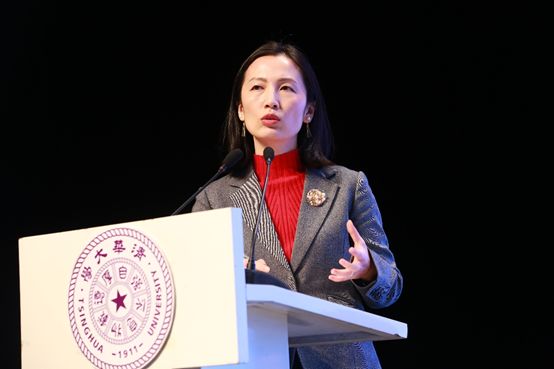
[5] After first agreeing with the viewpoint outlined in the report that the “real growth rate is lower than the longer-term potential growth rate,” Helen Hong Qiao emphasized that the domestic output gap does not get enough attention in China. She also mentioned that boosting confidence comes from revitalizing the economy, which is ultimately what the market is most concerned about. Managing expectations is closely linked to market confidence, with the current slip in confidence mainly being due to policy uncertainty and sluggish demand. This situation therefore calls for policy readjustments if the status quo is to be redirected in another direction. Stimulating domestic demand is of the utmost priority in terms of the latest round of policies, which, if not carried out in an opportune fashion, will otherwise put even greater pressure on the economy.
Qiao remarked on how the recent globalization trend has reversed, as Western countries raise their concerns over national security and overcapacity while calling into question China's industrial policies and subsidies, and with global public opinion increasingly turning against Chinese products. Chinese companies need to seek out new strategies to engage the global market, such as setting up factories in local markets to accommodate trade barriers. When it comes to companies going overseas, she believes that there is no other choice given the state of the domestic market. Although this approach might be conducive to maximizing profits in the shorter term, in the long run the contribution to domestic GDP and employment will prove to be limited. Therefore, Qiao once again reiterated the importance of stimulating domestic demand, including putting forward proposals covering the three domains of monetary policy, fiscal policy and incentive mechanisms. Reducing financing costs, issuing central government debt, and resetting incentives can enhance policy credibility, in addition to improving the consumption and investment environment.
As concerns rekindling confidence to attract more foreign investment into China, Qiao stressed that the main channel is to strengthen the legal system in relevant areas of concern, rather than relying on short-term policy guidance. She commented that investor sentiment and market performance are closely interrelated, with longer-term efforts focused on stabilizing the country’s legal system and policy orientation being the only way to win the trust of foreign investors.

[6] Yuan Gangming started off by analyzing some of the main challenges facing China's economy, having especially taken note of the impacts on the economy from the real estate market’s downswing. He has come to accept the view that China's economy in general is indeed coming under strains, which is particularly the case given ongoing readjustments in the real estate sector. Although real estate prices have fallen, the situation is nowhere near as bad as the bursting of the Japanese real estate bubble in the 1990s. China's real estate bubble has precipitated a reasonable pace of decline, with the sector moreover expected to stabilize and recover to a certain extent.
Despite all the challenges, Yuan also sees bright spots in China’s economic development, with the rapid growth of the automotive industry being a prime example. He believes that the outstanding growth trajectory for the country’s auto industry is not simply a flash in the pan, but instead is likely to make a longer-term contribution. China's auto exports have already put the country in the top spot in the world, surpassing Japan's auto industry export performance at the peak of its development, which has therefore generated a new source of growth for the domestic economy. Yuan pointed out that the automotive industry is currently the fastest growing sector in China, with a growth rate of more than 30% that far exceeds the average level, and to some extent has made up for a decline of more than 20% in the real estate sector. The rise of the auto industry has not only balanced out the declines in other segments of the economy, but has also forged a new path for China's economic development. At the same time, in terms of global competition within the auto industry, Chinese auto companies are expected to continue nonstop in their pursuit of technological innovation, maintaining their competitive advantage through technological upgrading and substitution, and further consolidating their dominant position in the international market.
In the interactive session at the end of the forum, the panelists also had the chance to partake in candid exchanges with members of the audience, addressing several other hot topics of interest.




